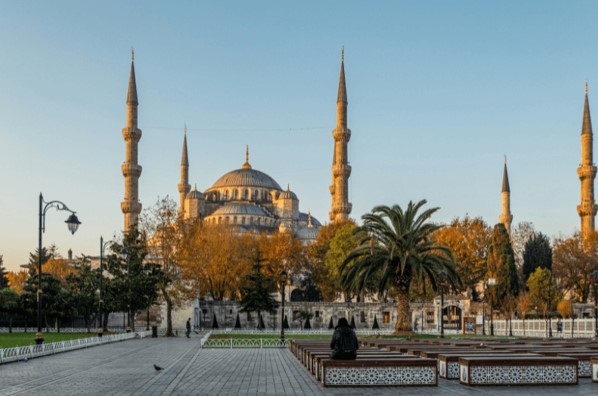Two years ago, the UK’s then-foreign secretary made the unprecedented call for British travellers around the world to return home.
Dominic Raab’s announcement was the first of dozens of government moves in response to the coronavirus pandemic, which created layers upon layers of chaos for the travel industry.
These are the key dates – with present-day reflections from some senior travel figures.
2020
23 March
“We are strongly urging UK travellers overseas to return home now where and while there are still commercial routes to do so,” said the foreign secretary, Dominic Raab.
“If you are on holiday abroad the time to come home is now while you still can.”
12 May
“If people cannot walk or cycle but have access to a car, we urge them to use this before considering public transport,” says the transport secretary, Grant Shapps.
22 May
After scrapping all inbound travel restrictions in March, as coronavirus took hold, the home secretary, Priti Patel, announces two weeks of quarantine will be mandatory for almost all arrivals from 10 June 2020.
She said: “Now we are past the peak of this virus, we must take steps to guard against imported cases, triggering a resurgence of this deadly disease.
“As the transmission rate across the UK falls, and the number of travellers arriving in the UK begins to increase, imported cases could begin to pose a larger and increased threat.”
2 June
As other European nations lift restrictions, More details emerge of the quarantine rules to be imposed in the UK: “All arrivals, bar a short list of exemptions, will be required to complete an online locator form to supply contact details, travel details and the address of where they will self-isolate for 14 days.”
“Where international travellers are unable to safely self-isolate in their own accommodation, the government will support them finding appropriate accommodation at their own expense.”
11 June
Lockdown mark 1 ends and easyJet resumes flights, Tina Milton, one of the cabin crew aboard flight 883 from Gatwick to Glasgow, says: “It’s the start of the future.”
The government issues travel advice for airline passengers – who are urged to check in all baggage including hand luggage, and remain seated as much as possible during the flight.
15 June
Face masks become mandatory on public transport in England.
10 July
“Travel corridors” first open for British travellers, allowing quarantine-free trips to France, Italy, Spain and Turkey, but not to Portugal or Croatia.
“I hope this announcement provides good news to the many of us who want to enjoy a holiday abroad this year,” says Grant Shapps.
25 July
At a few hours’ notice, the government says: “People returning to the UK from Spain from midnight tonight will need to self-isolate for two weeks, with the country removed from the travel corridors list.”
After just 15 days, the most popular destination for British holidaymakers has been put back on the quarantine list. The transport secretary Grant Shapps, who has just arrived for a holiday in Spain, is among the travellers affected.
“The government is urging employers to be understanding of those returning from Spain who now will need to self-isolate.”
15 August
France, the Netherlands and Malta are removed from the “travel corridors” list – with each now requiring two weeks of self-isolation.
Stena Line accelerates its overnight ferry from Hook of Holland to Harwich in order to arrive before the 4am deadline, so its passengers won’t have to quarantine.
22 August
Austria and Croatia join the mandatory self-isolation list. For the first time Portugal is given quarantine-free status, which lasts for just three weeks.
9 September
Travel restrictions get granular, with quarantine mandatory from just seven Greek islands: Crete, Lesvos, Mykonos, Santorini, Serifos, Tinos and Zakynthos.
Due to Covid cases, the Portuguese mainland is put in the same risk category as central Kabul and parts of Somalia, with the Foreign Office saying: “[We] advise against all but essential travel to mainland Portugal.”
16 September
The chief executive of British Airways tells MPs that his airline is burning through £20m in cash per day and flying only 18.7 per cent of passengers compared with 2019.
Speaking to the Transport Select Committee, Alex Cruz said: “We’re still fighting for our own survival.”
19 September
Dominic Raab chooses United Airlines rather than British Airways for a trip back from Washington DC.
1 October
Poland and Turkey are next to join the quarantine list. Italy follows on 15 October.
22 October
Good news at last, with the Canary Islands briefly opened up for travel. However, quarantine is reimposed on arrivals from the isles on 12 December.
7 November
The UK’s first outright travel ban is announced: “Visitors arriving into the UK from Denmark will not be permitted entry,” says the government, after concerns about an outbreak of a Covid-19 variant traced to mink. Anyone who has been in Denmark in the last 14 days is urged to self-isolate, along with their whole household.
24 November
The first Global Travel Taskforce report is published. One recommendation – for halving the length of quarantine if travellers take a “test to release” – is introduced from 15 December. Most of the other recommendations are not followed up, including
- “The development of a global framework for the validation of tests and vaccination record”
- “The feasibility of short stay exemptions for businesses and tour groups”
- “Measures to facilitate safe transit”
24 December
A ban on arrivals from South Africa begins, with exemption for people with permanent residency in the UK – who “are required to self-isolate for 10 days along with their household”.
It later emerges that only 3 per cent of arrivals in the UK in 2020 were ever checked to ensure they were quarantining.
2021
6 January
All international leisure travel from the UK is banned until 17 May. Anyone at an airport, seaport or international railway station seeking to leave the UK without a reason for exemption faces a fine.
15 January
“Entry to the UK banned for passengers arriving from destinations across South (and Central) America, Portugal, Panama and Cape Verde.” This is the first “red list”, as we came to know it.
A flight ban is imposed on all red list countries, leading to the unintended consequence that people stranded there are forced to take indirect routes, making more stops and making it harder to detect people arriving from high-risk locations.
18 January
Mandatory pre-departure tests are introduced for arrivals to the UK. Ministers had previously insisted that travel testing had no value.
27 January
“There are still too many people coming in and out of our country each day,” says Priti Patel.
The government says: “There will be an increased police presence at ports and airports, fining those in breach of the stay at home regulations – anyone without valid reason for travel will be directed to return home and may face a fine.”
31 January
Government begins advertising campaign warning: “Going on holiday is illegal.”
Julia Lo Bue-Said, chief executive, Advantage Travel Partnership, now says: “The government embarked on a preposterous advertising campaign, spending taxpayers’ money promoting going on holiday as illegal.
“It made criminals out of travellers, criminalising the outbound travel sector and leaving it with no ability to trade in the only way it can.
“Time and time again we heard ministers condemning outbound travel, encouraging Brits to stay at home despite rising Covid cases in the UK.
“The damage done at the time by ministers, even as travel bans lifted was unjust, causing the sector significant harm and distress.”
2 February
Scotland’s first minister, Nicola Sturgeon, announces plans for “a managed quarantine requirement for anyone who arrives directly into Scotland, regardless of which country they have come from”. In other words: arrivals from everywhere (apart from Ireland) must go into hotel quarantine.
Predictably, Scottish travellers switch to English entry points.
10 February
Grant Shapps warns prospective holidaymakers against making any plans.
He tells the BBC Today programme: “On the shrinking chance that there’s anybody listening to this interview at this stage and thinking of booking a holiday under the current circumstances, bear in mind you cannot legally do that at the moment.
“Until you know the result of a lockdown which we can’t know until we have more data, more information, more information on vaccines as well, please don’t go ahead and book holidays for something which at this stage it is illegal to actually go and do – whether it’s here or abroad.
Mr Shapps also said jail terms of up to 10 years for people who lied on their passenger locator form were appropriate.
“I think the British public would expect pretty strong action,” he said.
15 February
Hotel quarantine begins for red list arrivals. “Anyone travelling to the UK from a country on the UK’s travel ban list will be required to quarantine in a government-approved facility for a period of 10 days,” says the government.
“To ensure compliance, fines will be issued and will range from £5,000 rising to £10,000 for arrivals who fail to quarantine in a designated hotel.”
1 March
Labour’s Yvette Cooper, chair of the Home Affairs Select Committee, joins the chorus of politicians urging prospective holidaymakers not to book trips. She tells BBC Today: “We’ve been advised on the committee that the strength of these border measures because even more important as domestic cases fall.
“The trouble is at the moment the government is allowing people to think that those summer holidays are all going to be possible and international travel is going to return.”
11 March
With just 58 hours remaining before it became a criminal offence even to turn up at a UK airport, railway station or ferry port without a completed Declaration to Travel form, the document is finally published. All departing travellers must complete it.
The form asks travellers for their personal details including their address, passport number and destination, and requires them to tick a box to indicate their claimed reason to travel.
In England, anyone who enters “a port of departure to travel internationally” without a completed form is committing a criminal offence – even if they are legally entitled to travel – and faces a fixed penalty of £200.
“Every new restriction on freedom, such as the ill-conceived Declaration to Travel, diminishes us, and our place in the world,” I write.
9 April
Philippines, Pakistan, Kenya and Bangladesh are added to the UK’s red list. But travellers are given a week’s notice – leading to a programme of charter flights being set up in Pakistan to get people home before the deadline.
23 April
India is added to the red list. “Move follows new data showing an increased risk of importation of new variant,” says the government.
17 May
With international leisure travel permitted once again, the UK’s “traffic light system” is introduced, with:
- Hotel quarantine for arrivals from red list countries
- Self-Isolation at home for amber list arrivals
- Testing but no quarantine for those arriving from green list countries
The only feasible destinations for British travellers initially are Portugal, Iceland and Gibraltar.
The Foreign Office travel advice warns against travel to “amber” countries.
Derek Jones, managing director of Kuoni UK, now says: “The most frustrating thing for us was the use of Foreign Office advice to stop travel to destinations when the ‘traffic lights’ were green or amber.
“Symbolic of the lack of inter-departmental cooperation within the government at key moments during the crisis.
“To be fair, they did eventually get their act together and the response to Omicron was way better. But it took a long time for them to grasp the challenges that the industry was facing.”
3 June
Grant Shapps announces Portugal is to be taken off the green list due to “a mutation of the Delta variant”. No new countries are moved to the green list. Conversely, eight more countries are added to the red list, including Egypt, Trinidad and Costa Rica.
I tweeted: “The day the travel industry died?”
Air fares soar as travellers rush to beat the quarantine deadline from Portugal.
24 June
Malta, Madeira, the Balearic Islands, and some Caribbean islands including Barbados, are added to the green list.
8 July
Government announces that from 19 July, fully vaccinated arrivals from amber list countries can avoid self-isolation. They must continue with a pre-departure test and a post-arrival PCR. However, only those with jabs administered in the UK are considered vaccinated; everyone who received a vaccine elsewhere must continue to quarantine.
16 July
Ahead of the rules being eased, France is moved to a new category, swiftly dubbed “amber plus” – effectively a travel ban at the start of the school summer holidays in England and Wales.
France’s Europe minister, Clément Beaune, tweeted: “The UK’s quarantine measures for France are excessive and incomprehensible in health terms.”
The foreign secretary, Dominic Raab, explains France’s amber plus status was decided because of “the prevalence of the so-called Beta variant, in particular in the Réunion bit of France”.
The fact that this island is 5,800 miles away from Paris was deemed irrelevant.
Yet Réunion island itself remains on the regular amber list. Anyone fully vaccinated seeking to travel from there to the UK without quarantine need only avoid mainland France.
The restriction remains in place for three weeks, wrecking plans for hundreds of thousands of travellers.
Danny Callaghan, chief executive of the Latin American Travel Association, now says this episode “really highlighted how little the government understood what was happening in the world”.
He says: “Had they been meaningfully engaged with the travel industry on changing restrictions, we could have explained that Réunion is 6,000 miles from France and helped the government avoided a rather embarrassing faux-pas.
“That decision did cause a lot of despair in the industry as we realised what were were up against.”
1 August
As peak season begins, fully vaccinated arrivals to the UK from “green list” countries must take a test before departure to the UK and an expensive PCR test after arrival. No other European country makes such demands. They see no particular value in multiple tests for low-risk arrivals from low-risk nations.
31 August
After Montenegro is moved to the red list, airlines scramble to organise an airlift back to the UK before hotel quarantine becomes mandatory. But easyJet suffers a technical problem. A replacement aircraft is sent out, but only to Dubrovnik – across the border in Croatia.
Dozens of non-UK passengers are excluded from the flight because they are not allowed to cross the frontier.
The easyJet plane carrying British travellers touches down at Gatwick at 3.58am – two minutes ahead of the 4am deadline.
16 September
As infection rates soar in Britain, I write: “The UK is in the odd and counter-intuitive position of having both the highest Covid infection rates of any major European country and also the most draconian restrictions on arrivals from abroad.”
Arrivals to the UK in July and August 2021 were just 14 per cent of the numbers during the same period of 2019.
4 October
Green and amber categories are scrapped, with fully vaccinated arrivals requiring only a post-arrival PCR test. The red list remains.
“We are accelerating towards a future where travel continues to reopen safely and remains open for good,” says Grant Shapps.
24 October
The UK’s post-arrival test is downgraded to a cheap, fast lateral-flow test.
28 October
The red list of high-risk countries is emptied – but not abolished.
26 November
In response to the detection of the Omicron variant, the red list is reinstated for arrivals from six southern African countries: South Africa, Botswana, Lesotho, Eswatini, Zimbabwe and Namibia. This later expands to 11 nations, including Nigeria.
Mandatory hotel quarantine for these countries begins two days later.
30 November
Mandatory self-isolation for all arrivals is back – with the post-arrival lateral flow test replaced by a PCR. Fully vaccinated travellers can leave quarantine when they get a negative result.
“Close contacts of anyone who has tested positive for the Omicron variant are required to isolate for 10 days regardless of whether they have been vaccinated,” says the government.
1 December
Spain bans unvaccinated arrivals from the UK. The rule continues in force even for under-16s for 10 weeks, blighting Christmas, New Year and half-term holidays for many families.
16 December
Proving that the UK government does not have a monopoly on nonsensical decisions, France imposes a travel ban on British passengers. It lasts for three weeks, wiping out Christmas and New Year holidays and family reunions for many.
7 January
Pre-departure tests are finally dropped for fully vaccinated arrivals.
9 January
Fully vaccinated arrivals are now able to take a lateral flow rather than a PCR for their “day two” post-arrival test.
24 January
Grant Shapps says post-arrival testing for fully vaccinated travellers to the UK has “outlived its usefulness”, but ministers see fit to keep it in place for a further 18 days. In the interim, British travellers spend an estimated £60m on tests.
18 March
All coronavirus restrictions for travellers arriving in the UK are lifted.




More Stories
Maximizing Your Savings – Expert Strategies For Travel Discounts
Unlocking Growth: 15 Strategies for Boosting Leads and Customers for Your North Georgia Business
Indonesia Travel Advice & Safety